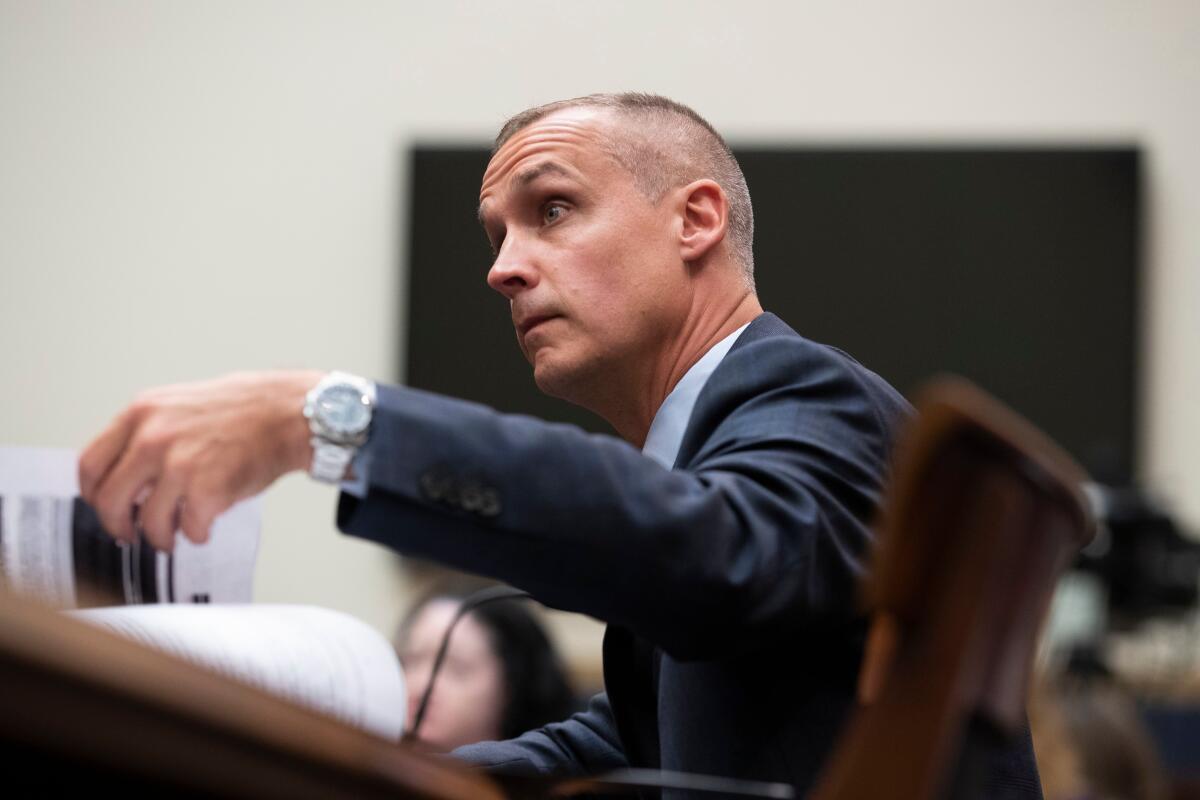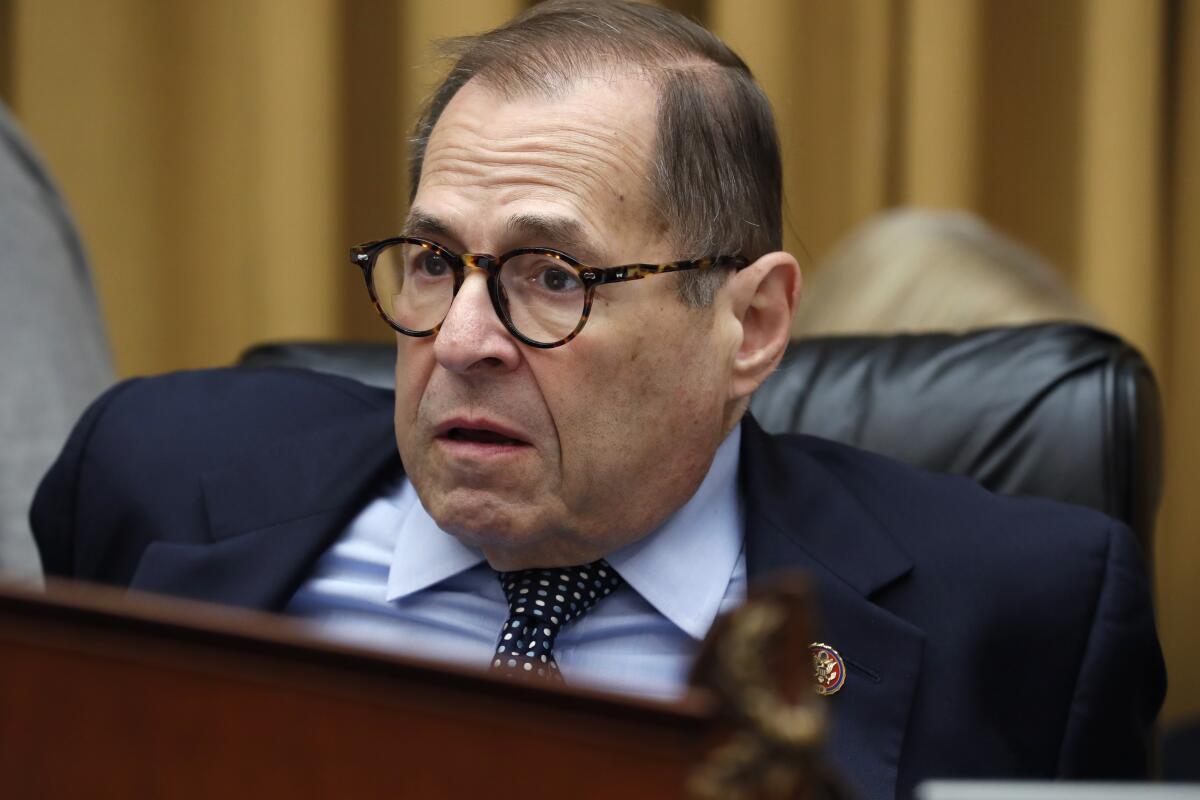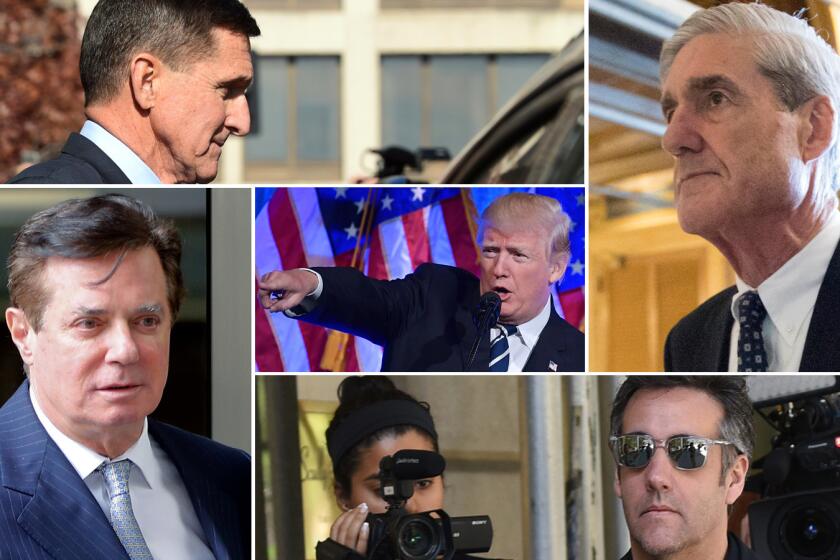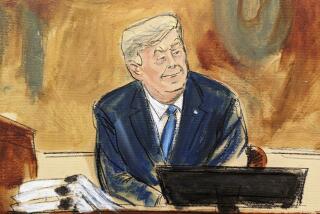Corey Lewandowski clashes with Democrats at House impeachment hearing

- Share via
WASHINGTON — The push by some Democrats to impeach President Trump has been marked by false starts, semantic debates and legal roadblocks. Not surprisingly, perhaps, the first House Judiciary Committee hearing in the hotly contested process featured much of the same Tuesday.
The only witness, Trump’s first campaign manager, Corey Lewandowski, stonewalled. Democrats insulted him and he insulted them back. Republicans unsuccessfully tried to end the hearing early, calling it a sham. The back-and-forth was cantankerous, colorful and mostly unproductive.
Despite more than five hours of questioning, Democrats uncovered little they didn’t already know from special counsel Robert S. Mueller III’s final report in April.
It was a rocky start to hearings that Democrats say will help them determine whether to present articles of impeachment against Trump over allegations that he obstructed justice by trying to interfere with the Russia investigation, an especially fraught process as the 2020 presidential race gets underway.
Lewandowski confirmed that Trump asked him to tell Jeff Sessions, then the U.S. attorney general, to limit the investigation to meddling in future elections rather than examine what happened during the 2016 campaign.
But Lewandowski insisted that the president did not ask him to do anything wrong, and he routinely refused to elaborate on anything that wasn’t already included in the Mueller report, which he said he believed was accurate.
“The White House has directed me not to disclose the substance of any discussions with the president or his advisors to protect executive branch confidentiality,” he said.
Trump was clearly pleased, tweeting from Air Force One on his flight to California that his former campaign manager had delivered “such a beautiful opening statement.”

Democrats were apoplectic, sometimes shouting at Lewandowski. Rep. Steve Cohen (D-Tenn.) called him “some kind of a Forrest Gump when it comes to corruption.” Rep. Hank Johnson (D-Ga.) said he was difficult to pin down, like “a fish being cleaned with a spoon.”
Rep. Hakeem Jeffries (D-N.Y.) asked Lewandowski whether he was “the hit man, the bag man, the lookout, or all of the above?”
Lewandowski brushed off the question. “I think I’m the good looking man, actually,” he replied.
Under questioning by the Democrats’ lawyer, Lewandowski admitted to misleading reporters about his conversations with Trump, saying, “I have no obligation to be honest with the media because they are just as dishonest as everybody else.”
He also refused to say whether he demanded immunity before answering questions from the special counsel’s office.
The Russia investigation has provided a barrage of headlines, court cases, tweets and speculation since before the last presidential election.
Sometimes Lewandowski stalled for time, flipping through the lengthy Mueller report looking for paragraphs cited by lawmakers. When directed to answer a question from Rep. Sheila Jackson Lee (D-Texas), Lewandowski complained that it was “just a rant.”
He also referred to Rep. Eric Swalwell (D-Dublin) as “President Swalwell,” a jab at the California congressman’s abandoned White House bid.
Lewandowski appeared to enjoy the spotlight. At one point he plugged his book — “available at fine bookstores everywhere,” he said — and during a break, he tweeted out his website for a potential Senate campaign in his home state of New Hampshire.
He remained steadfastly loyal to Trump, denouncing those who had pursued the Russia investigation.
“I think that this fake Russia collusion narrative is the greatest crime committed against the American people in a generation, if not ever,” Lewandowski said.
He also downplayed an episode where Trump directed him to tell Sessions that he would be fired if he did not take the meeting with his former campaign manager.
“I took that as a joke,” Lewandowski said.
Lewandowski never delivered the message to Sessions — a meeting was arranged but canceled by Sessions because of a scheduling conflict, according to the Mueller report — but Democrats have described the conversations as examples of how Trump tried to obstruct justice.
Mueller did not establish a criminal conspiracy between Moscow and Trump’s campaign. He also did not make a determination on whether Trump violated the law against obstructing justice, but Atty. Gen. William Barr and Deputy Atty. Gen. Rod Rosenstein later said the president did not.
Lewandowski was flanked by empty chairs at the hearing. The committee also had subpoenaed Rick Dearborn, a former deputy chief of staff, and Rob Porter, a former staff secretary, but the White House directed them not to appear.
“As senior advisors to the president, Mr. Porter and Mr. Dearborn are immune from being compelled to testify before Congress,” said Steven Groves, the deputy press secretary.
The intransigence could add to House Democrats’ legal workload. They’re already suing Donald McGahn, Trump’s first White House counsel, to compel his testimony.
“We should call this what it is, an absolute cover-up by the White House,” Rep. Jerrold Nadler, the committee chairman, said Tuesday. He said he would consider whether Lewandowski should be held in contempt.
Ross Garber, a Tulane University law professor who specializes in political investigations and impeachment law, said claims of executive privilege — a legal principle that allows presidents to keep their conversations private — have not yet been fully tested in court.
So far Trump, whose administration has aggressively fought the Democrat-led House Judiciary Committee, has been able to hold congressional investigators at bay.
“These assertions of privilege and immunity have borne few if any adverse consequences, either legally or politically,” Garber said. “It doesn’t surprise me that the president and the White House would make these assertions.”
More to Read
Get the L.A. Times Politics newsletter
Deeply reported insights into legislation, politics and policy from Sacramento, Washington and beyond. In your inbox twice per week.
You may occasionally receive promotional content from the Los Angeles Times.












